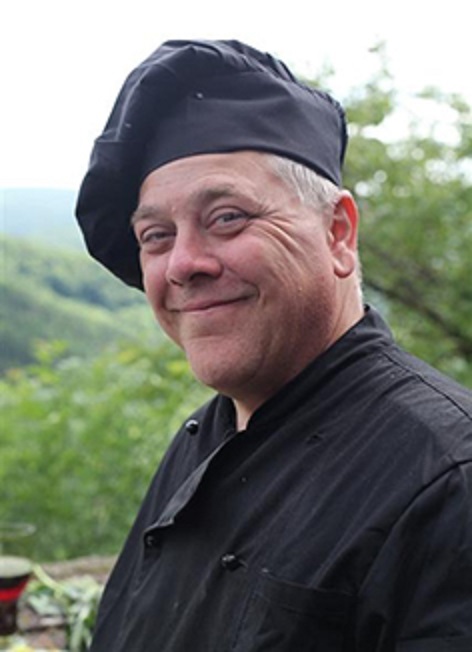Year of Food lecture discusses culinary past and present
By Sarah Kirkpatrick, Staff Writer
Dr. Ken Albala is no ordinary history professor. He is a chef, an artist and an explorer, tracking down historical recipes in primary sources to bring them to life in modern times. He has catered penthouse dinners in San Francisco, taught a cooking class in Vienna, worked for a filmmaker and written and edited over 23 books about food. Albala teaches at the University of the Pacific and directs a Food Studies MA program in San Francisco, but on November 3 he arrived at Gettysburg College to give a lecture titled “The Family Meal in Popular Culture.” His speech was the third and final installment in the college’s Year of Food Lecture series.
Albala, with characteristic humor, told the Gettysburg community his story about “how a historian comes to be cooking and why this is valuable,” a journey that culminated in making noodle soup every morning for the past two years. Through his work, he aims to establish culinary research as a legitimate branch of history. Albala’s unconventional career began with an interest in food. Trained as a Renaissance historian and able to read several European languages, he scoured historic texts to understand topics like the relationship between religion and food and the foods that people believed were healthy in the past. But he encountered one problem: It was impossible to tell what traditional foods actually tasted like by reading books about them. Most historians dismiss this detail, but to Albala taste is vital since it offers a commentary on traditional perspectives. Albala saw only one possible solution. It was time to do some cooking.
Albala is not the only person to have ever tried replicating Renaissance era recipes. But he is one of the few to prepare them in an authentic way. For convenience, most chefs substitute common ingredients for rare spices and modern appliances like ovens and stoves for traditional cooking methods. Almost invariably these efforts fail, ending with disappointing finished products and frustrated cooks. On the other hand, Albala follows historical cookbooks as accurately as possible. “If you want to know what people liked in the past,” Albala explained, “you have to follow their instructions.”
Following these instructions can be harder than it sounds. One of the professor’s first projects, roasting a chicken, involved making a homemade turnspit to simulate how the bird would have been prepared by Renaissance Europeans. Despite the extra work, Albala claimed that the chicken tasted incredible with a distinct hint of wood. This experiment only heightened his curiosity. Albala tried recipes that had been served to former popes, royal families, and Renaissance people. With this research, he was able to successfully ferment his own pickles, make salami, bake traditional bread and produce his own cheese.
After years of cooking European foods, Albala’s journey took an interesting twist when he tried Ramen Noodles for the first time. Desperate for a quick breakfast on one of his trips, Albala tasted the noodles at a restaurant and discovered a new culinary passion: noodle soup. Today he experiments with unconventional taste combinations, interesting patterns and absurdist recipes. Some of his memorable creations include candy noodle soup, which was made entirely out of desserts, the world’s smallest noodles and an ironic soup that was filled with pieces of paper from the pages of its own recipe.
In his lecture, Albala convinced the audience that historic cooking is more than an eccentric hobby. It is a vital component of his career as a historian, allowing him to appreciate the difficult cooking methods and distinctive tastes found in traditional recipes. Albala’s research gives him a chance to replicate culinary techniques, but also to create his own edible art. There is no way to predict where this culinary journey will lead him next.

